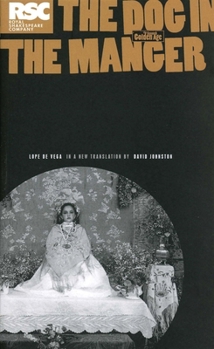The Dog in The Manger
Select Format
Select Condition 
Book Overview
The Spanish Golden Age celebrated one of the most dynamic, energetic and stylish periods of world drama which exploded onto the stages of Madrid at the turn of the seventeenth century. It was a decisive period in world drama, similar to the periods of great national drama which occurred in seventeenth century London and fifth century Athens. The Spanish Golden Age was big business - professional, commercial theatre with plays touring all over Spain and Europe
The Royal Shakespeare Company's 2004 Spanish Golden Age Season presented plays from this era, the work of some of Spain's greatest playwrights. Rarely seen in the theatre, and now in translations by leading contemporary writers, the plays in this season dramatised our fascination with the themes of seduction, honour and revenge.
In The Dog in the Manger, Diana, Countess of Belfor, a beautiful and headstrong young woman, is beset by aristocratic suitors urging marriage but refuses them all. One-night she discovers her handsome young secretary seducing her favourite lady in waiting and is consumed with jealousy. A heartbreaking love triangle is forged and so begins a tale of forbidden love, envy and passion. The Dog in the Manger is a painful and hilarious comedy for anyone who has ever fallen in love with someone they shouldn't have.
The Royal Shakespeare Company's 2004 Spanish Golden Age Season presented plays from this era, the work of some of Spain's greatest playwrights. Rarely seen in the theatre, and now in translations by leading contemporary writers, the plays in this season dramatised our fascination with the themes of seduction, honour and revenge.
In The Dog in the Manger, Diana, Countess of Belfor, a beautiful and headstrong young woman, is beset by aristocratic suitors urging marriage but refuses them all. One-night she discovers her handsome young secretary seducing her favourite lady in waiting and is consumed with jealousy. A heartbreaking love triangle is forged and so begins a tale of forbidden love, envy and passion. The Dog in the Manger is a painful and hilarious comedy for anyone who has ever fallen in love with someone they shouldn't have.
Format:Paperback
Language:English
ISBN:1840024356
ISBN13:9781840024357
Release Date:September 2005
Publisher:Oberon Books
Length:128 Pages
Weight:0.35 lbs.
Dimensions:0.4" x 5.0" x 8.2"
Customer Reviews
1 rating
pleasant Spanish comedy
Published by Thriftbooks.com User , 23 years ago
As far as I know, El perro del hortelano (The gardener's dog) is a truly unique work in Lope de Vega's canon, although there may be some similar comedies among the hundreds of plays this Spanish author wrote. It shows only vestiges of the typical dramas of the Spanish Golden Age, i. e. the plot does not moves around the typical vengeance-for-the-loss-of-the-honour-of-the-virgin-daughter (though the former Spanish caste-system also plays a very important role here) and contrary to what the title might suggest, neither gardeners nor dogs pop up during the story. The title refers to a Spanish saying about the gardener's dog, who does not eat his bone but neither lets any other eat it. This refers to the behaviour of the aristocrat heroine in the story who is in love with a scribbler of a lower rank, but still she does not let him marry to other girls. The freshness of the story comes partly from the psychologically complex characters, especially the already mentioned princess, who knows that is impossible to have her love (don't worry, the story does have a happy ending) but still gives false hopes to the poor hero. The charm of the story also comes from the witty dialogues, the truly original word-plays, especially during the duel of the two lovers, that can remind us of the fighting couples of the Shakespearean comedies, like Taming of the shrew and Much ado about nothing. Recommended to all men trying to all men who hopelessly try to get their seemingly unreachable idol.





